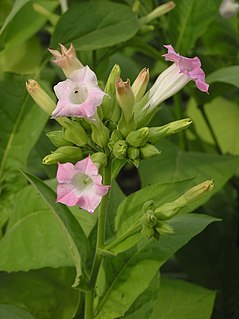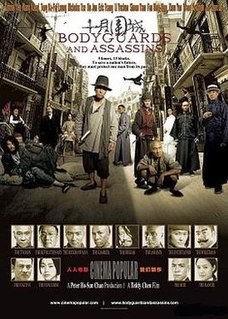
Nicotiana tabacum, or cultivated tobacco, is an annually grown herbaceous plant of the Nicotiana genus. The plant is tropical in origin, is commonly grown throughout the world, and is often found in cultivation. It grows to heights between 1 and 2 meters. Research is ongoing into its ancestry among wild Nicotiana species, but it is believed to be a hybrid of Nicotiana sylvestris, Nicotiana tomentosiformis, and possibly Nicotiana otophora. It is the most commonly grown of all plants in the genus Nicotiana, the plants' leaves commercially grown to be processed into tobacco.
The literary inquisition, also known as speech crime (以言入罪), refers to official persecution of intellectuals for their writings in China. The Hanyu Da Cidian defines it as "the ruler deliberately extracts words or phrases from intellectual's writings and arbitrarily accuse him in order to persecute him" ("旧时谓统治者为迫害知识分子,故意从其著作中摘取字句,罗织成罪"). The Inquisition took place under each of the dynasties ruling China, although the Qing was particularly notorious for the practice. In general, there are two ways a literary inquisition could be carried out. First is that the conviction came from the writing itself. That is, the writing was the direct cause of the persecution. The second is that the writing was used as a tool to provide legitimate evidence for a predetermined conviction. Such persecutions could owe even to a single phrase or word which the ruler considered offensive. Some of these were due to naming taboo, such as writing a Chinese character that is part of the emperor's personal name. In the most serious cases, not only the writer, but also their immediate and extended families, as well as those close to them, would also be implicated and killed.

2 Champions of Shaolin is a 1980 Shaw Brothers film directed by Chang Cheh. Starring the Venoms, it continues the then-popular theme of feuds between Shaolin and Wu tang. The film was digitally manipulated by Joseph Kahn for the Chemical Brothers' music video "Get Yourself High".

Bodyguards and Assassins is a 2009 Hong Kong historical action film directed by Teddy Chan, co-produced by Peter Chan, featuring an all-star cast including Donnie Yen, Wang Xueqi, Tony Leung Ka-fai, Nicholas Tse, Hu Jun, Eric Tsang, Simon Yam, Fan Bingbing, Zhou Yun and Leon Lai. The film is about Sun Yat-sen making a secret trip to British-ruled Hong Kong to discuss plans with fellow revolutionaries to start a revolution to overthrow the Qing Empire and establish a republic in China. When Sun faces an attempt on his life by assassins sent by the Qing government, a motley crew of people from various walks of life band together to protect him and ensure that the meeting goes as planned.

Sword Stained with Royal Blood is a 2007 Chinese television series adapted from Louis Cha's novel of the same title. The series was first broadcast on CTV in Taiwan in 2007.

Justice Bao is a Chinese TV series starring producer Jin Chao-chun as the Song dynasty official Bao Zheng. The series ran for 3 seasons from 2010 to 2012. In addition to Jin, Kenny Ho, Fan Hung-hsuan and Lung Lung again reprise their iconic roles from the 1993 Taiwanese hit Justice Pao and the 2008 Chinese series Justice Bao.
Thottopalayam thottimvirus, formerly Thottapalayam virus, (TMPV) is single-stranded, enveloped, negative-sense RNA virus species of the genus Thottimvirus in the Bunyavirales order. It is the first hantavirus to be isolated from a shrew. It was discovered in India in 1964.

The Seven Heroes and Five Gallants is a 1994 Taiwanese television series produced by Chinese Television System (CTS) a few months after its prequel Justice Pao, which was also produced by Chao Ta-shen. Dozens of actors appeared in both series, but only Sze Yu and Tu Man-sheng reprised their roles. Fan Hung-hsuan and Lung Lung chose to portray new characters rather than their iconic roles.
Streptomyces jiujiangensis is a bacterium species from the genus of Streptomyces which has been isolated from rhizosphere soil from a pine tree from the Mount Lu in the Jiangxi province in China. Streptomyces jiujiangensis produces antialgal compounds.

The Four is a 2015 Chinese television series starring Hans Zhang, Yang Yang, William Chan and Mao Zijun. It is the latest adaption of Woon Swee Oan's novel Si Da Ming Bu. The series aired on Hunan TV from 17 March to 23 June 2015.
Sphingobacterium nematocida is a Gram-negative bacterium from the genus of Sphingobacterium which has been isolated from the tobacco-plant Nicotiana tabacum in Yuxi in China.
Arthrobacter endophyticus is a Gram-positive, aerobic and non-motile bacterium from the genus of Arthrobacter which has been isolated from the roots of the plant Salsola affinis in Urumqi in China.
Lysinibacillus antri is a Gram-positive, rod-shaped, endospore-forming and motile bacterium from the genus of Lysinibacillus which has been isolade from soil from a karst cave in Xingyi county.
Lysinibacillus cavernae is a Gram-positive, rod-shaped and motile bacterium from the genus of Lysinibacillus which has been isolated from soil from a karst cave in Libo County.
Lysinibacillus endophyticus is a Gram-positive, aerobic and rod-shaped bacterium from the genus of Lysinibacillus which has been isolated from the root of a maize plant. Lysinibacillus endophyticus produces indole-3-acetic acid.
Lysinibacillus halotolerans is a Gram-positive, aerobic, halotolerant, endospore-forming and rod-shaped bacterium from the genus of Lysinibacillus which has been isolated from saline-alkaline soil from Lingxian County.
Lysinibacillus mangiferihumi is a Gram-positive bacterium from the genus of Lysinibacillus.
Lysinibacillus meyeri is a Gram-positive bacterium from the genus of Lysinibacillus which has been isolated from a medical practice.
Lysinibacillus yapensis is a Gram-positive, aerobic, spore-forming and motile bacterium from the genus of Lysinibacillus which has been isolated from deep-sea sediments from the Yap Trench.






